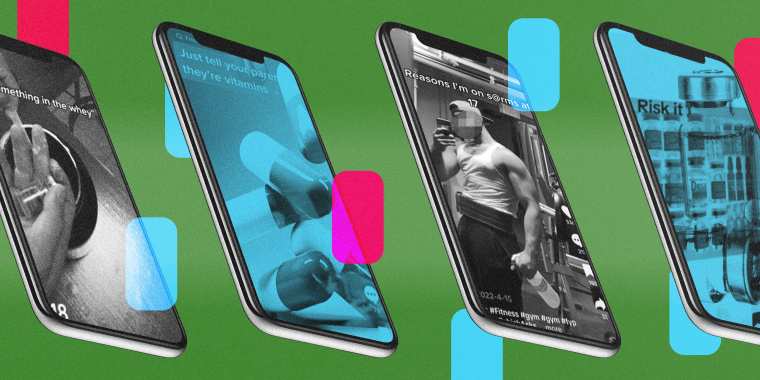People promoting steroids and similar products used for off-label performance enhancement are bringing in millions of views on TikTok and sometimes even targeting teenagers, according to a report from the Center for Countering Digital Hate, a tech watchdog group.
According to the report released Thursday, U.S. users ages 18-24 viewed videos using hashtags associated with steroids and related substances up to 420 million times in the last three years.
The group monitored hashtags associated with a variety of drugs popular in some fitness circles, including steroids and other illegal or highly regulated drugs and supplements that are not approved by the Food and Drug Administration for human consumption — what the report called “steroid-like drugs.”
Many of the videos promoting the drugs and supplements could be found with hashtags such as #teenfitness and #teenbodybuilding. The videos cited in the report often featured people with extremely large muscles and unrealistic body shapes promoting use of the substances while downplaying potential health risks and side effects.
Imran Ahmed, the CEO of the Center for Countering Digital Hate, said that “boys are being taught that they need to have really big muscles like Avengers to be a real man.”
“Meanwhile, they are seeing this ‘super serum’ on TikTok that is touted to help them to achieve that without making them aware how incredibly harmful these drugs are,” he said.
A TikTok spokesperson criticized the report’s methodology, saying the numbers in it also include “positive content” related to recovery from drugs. A spokesperson for the Center for Countering Digital Hate responded by saying "our analysis only examined hashtags where a majority of content posted with those hashtags promotes, sells or otherwise normalizes use of steroids or steroid-like drugs."
TikTok is home to a large and active fitness community that often openly discusses steroids and the unrealistic expectations that can come from their use. “Natty or not” videos have become their own subgenre on the app, in which people speculate on who is “natural” or who is not using steroids.
One such account still active on TikTok, referred to in the report and reviewed by NBC News, promoted the use of an estrogen-blocking hormone by teenagers to increase their penis size. The account, which has nearly over 40,000 TikTok followers, provided a discount code to a popular website that sells steroid-like drugs.
Anabolic-androgenic steroids, drugs that are subject to strict regulation under the Controlled Substances Act, have still been promoted on TikTok, according to the report. The sale and possession of them without valid prescriptions are considered felonies and could be punished by up to 10 years in jail. The report also pointed to drugs promoted on TikTok that are popular in fitness communities and considered similar to steroids — peptides and selective androgen receptor modulators, or SARMs. A TikTok representative said content related to SARMs will be removed when it is found. The FDA has not approved either for over-the-counter sale as drugs.
Many steroids and steroid-like drugs lack adequate research in humans to be properly prescribed or have been shown to have adverse effects in initial studies.
Often, such substances are sold as “research chemicals” to skirt such rules, according to the report.
The report also detailed videos that encourage teenagers to hide what it calls "steroid-like drugs" by telling their parents things like “They’re vitamins.”
The report said the research group found 35 influencers who are all involved in schemes that sell illegal or highly regulated steroid-like drugs, potentially allowing them to benefit financially from the sales of drugs.
The center said it found one TikTok bodybuilder account that inaccurately identified the personality involved as a doctor.
Ahmed said he believes TikTok has been slow to act because incentives aside from teen health are at play. By allowing the broadest range of content possible, TikTok can attract more users to stay on the app.
TikTok’s community guidelines say TikTok prohibits content that promotes recreational drug use or the sale of drugs.
Aside from the Center for Countering Digital Hate, the FDA has also issued warnings about social media’s role in the popularity and sale of steroid-like drugs, saying “social media posts by influencers and sellers of SARMs contribute to the availability and promotion of these dangerous products.”
It is not the first time that TikTok has appeared to struggle with drug-related content. Late last year, it removed some posts promoting migraine and epilepsy drugs to underage viewers as weight loss aids. In July, it launched another crackdown that temporarily banned some accounts that link to the use of the weight-loss drug Ozempic.
